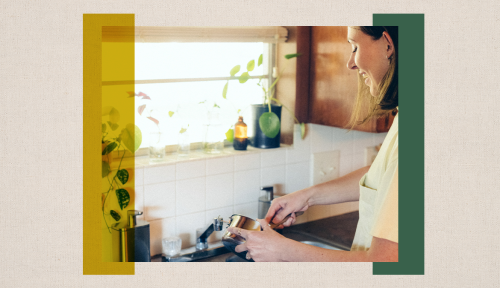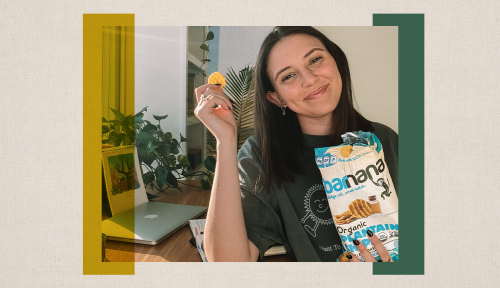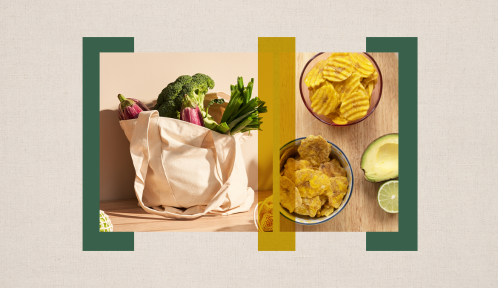In the world of fitness, slow and steady progress is everything: You walk before you run, run one mile before you enter a 5k, do pushups on your knees before graduating to plank position, etc. And as it turns out, that same methodology applies to the world of sustainability, too.
Take it from sustainability advocate Jessica Clifton, founder of Impact for Good, who always encourages people to start with small, attainable goals (doesn’t that sound like something a personal trainer would say?) when they’re hoping to give their routines an earth-loving makeover.
“From my experience, people are apprehensive about living more sustainably because they think they have to change their entire lives in one night,” Clifton says. “To me, living sustainably is just taking tiny steps over time. It’s deciding to pack your lunch for work instead of getting fast food, it’s remembering your reusable grocery bags at the store for the first time, and it’s deciding to recycle one material because it’s better than not recycling at all.”
For more of her expert insight, we asked her to share her top tips on how to incorporate planet-friendly habits into a daily routine. From cooking with food scraps to buying upcycled, organic snacks like Barnana’s Organic Plantain Crisps and Chips, you’ll be doing (metaphorical) sustainability pushups in no time.
Keep reading for 4 sustainable tips for building planet-friendly habits.

1. Start with an easy change that makes you feel good
Building habits is all about building momentum, so starting off with something that’s easy to accomplish will give you the proud satisfaction that will make you want to tack on more planet-friendly habits.
“Like BJ Fogg from the book Tiny Habits says, people change by feeling good,” Clifton says. “So if the most simple thing you can start doing is carry a reusable grocery bag, start there! Or if you think changing the milk in your coffee to plant milk is easy, start there. Start with literally the easiest change you can think of, and then feel good that you’re starting a more sustainable lifestyle! Getting started is the hardest part, so make it simple.”

2. Find ways to reduce your food waste
Did you know that more than 30 percent of food goes to waste globally, according to the Upcycled Food Association? And, according to Project Drawdown, preventing food waste would be the single most effective solution for preventing global warming of more than two degrees Celsius. It’s true—but it’s also true that there’s something you can do about it.
“Learning simple ways to reduce your food waste goes a long way,” Clifton says. “This can be as simple as freezing overripe bananas for banana bread or banana pancakes, freezing overripe tomatoes for salsa, and finding brands that are tackling food waste at the source—like how Barnana uses upcycled bananas and plantains to make snacks.”
To help save some of that food from going to the landfill, Barnana takes imperfect bananas and plantains that would be rejected from grocery store shelves (despite being perfectly delicious) and manufactures them into snacks like banana bites and plantain chips.
Another one of Clifton’s top tips for reducing food waste? Meal planning before you go to the grocery store so you don’t buy extra food you don’t need (especially if you go to the store when you’re hungry). “It’s simple decisions like these that truly add up over time,” she says.

3. Shop organic foods
You don’t have to toss your go-to grocery list in the garbage and switch to all-organic-everything all at once, but adding a few more organically grown foods to your cart (like Barnana Plantain Crisps or Chips) could help you make an impact on the planet in a simple way.
“Organic is known to be a more sustainable option than its conventional alternative because there [are] fewer pesticides in production and it enhances biodiversity and soil health,” Clifton says. “Again, don’t feel like you have to change everything overnight. If you just start by switching your normal apples to organic ones, great. You’re on your way to eating more organic foods.”

4. When in doubt, remember the motto ‘seeking simplicity’
Living a sustainable life can seem really complicated—especially when you have dreams of making a big impact—but Clifton urges people to remember that simple lifestyle tweaks can actually have the biggest impact of all.
“[My motto] ‘seeking simplicity’ is all about turning my lifestyle into something that is slow, meaningful, and well, simple,” she says. “Sustainability falls right into this motto because with a focus on simplicity, I’m avoiding overconsumption. Where I used to fall victim to impulse buying, I now have a 24-hour buying rule where I have to think about a purchase for a full day before I actually buy it. And when I do buy, I go for quality, not quantity, and try to support local, sustainable, and/or ethical businesses.”
Whether you’re just starting out on your sustainability journey or you’ve already got some of these planet-friendly practices on lock, keeping your mindset simple will help you turn your efforts into long-term habits that make a real difference.
Photos: Well+Good Creative/Jessica Clifton
Sign Up for Our Daily Newsletter
Get all the latest in wellness, trends, food, fitness, beauty, and more delivered right to your inbox.
Got it, you've been added to our email list.





